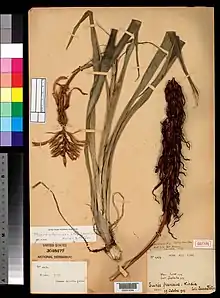Pitcairnia feliciana
Pitcairnia feliciana is a plant endemic to central Guinea in West Africa and is the only species of bromeliad not native to the Americas.[1][2] It can be found growing on sandstone outcrops (inselbergs) of the Fouta Djallon highlands in Middle Guinea.[3]
| Pitcairnia feliciana | |
|---|---|
 | |
| Scientific classification | |
| Kingdom: | Plantae |
| Clade: | Tracheophytes |
| Clade: | Angiosperms |
| Clade: | Monocots |
| Clade: | Commelinids |
| Order: | Poales |
| Family: | Bromeliaceae |
| Genus: | Pitcairnia |
| Species: | P. feliciana |
| Binomial name | |
| Pitcairnia feliciana | |
| Synonyms[2] | |
|
Willrussellia feliciana A.Chev. | |
Its specific epithet feliciana commemorates Henri Jacques-Félix (1907–2008), the French botanist who first collected it. In 1937, he discovered the plants growing on the steep rocks of Mount Gangan, near Kindia in the former French Guinea.[4][5]
The speciation occurred around 10 million years ago, therefore its distribution cannot be due to continental drift,[6] the Americas having separated from Africa much earlier. The species probably originates from seeds dispersed by migrating birds.[7]
It has bright orange-red, scentless flowers with abundant nectar that are typical of other bromeliads having birds as pollinators, although no actual sighting of birds pollinating the species has been recorded yet.[6]
References
- Larridon, I. (2018). "Pitcairnia feliciana". IUCN Red List of Threatened Species. 2018: e.T87753965A87753976. doi:10.2305/IUCN.UK.2018-1.RLTS.T87753965A87753976.en. Retrieved 20 November 2021.
- Kew World Checklist of Selected Plant Families
- Porembski, Stefan; Barthlott, Wilhelm (2000). Inselbergs: Biotic Diversity of Isolated Rock Outcrops in Tropical and Temperate Regions. Springer. p. 205. ISBN 978-3-540-67269-2.
- Techniques agricoles et productions tropicales (in French). Vol. 4. G.-P. Maisonneuve & Larose. 1965. p. 21.
- Jacques-Félix, Henri. "The Discovery of a Bromeliad in Africa". Selbyana. 21 (1/2): 118–124.
- Givnish, Thomas J.; Millam, Kendra C.; Berry, Paul E.; Sytsma, Kenneth J. (2007). "Phylogeny, adaptive radiation, and historical biogeography of Bromeliaceae inferred from ndhF sequence data". Aliso: A Journal of Systematic and Evolutionary Botany. 23 (1): 3–26. doi:10.5642/aliso.20072301.04.
- Porembski, Stefan; Barthlott, Wilhelm (1999). "Pitcairnia feliciana, the only indigenous African bromeliad". Harvard Papers in Botany. 5: 175–184.
